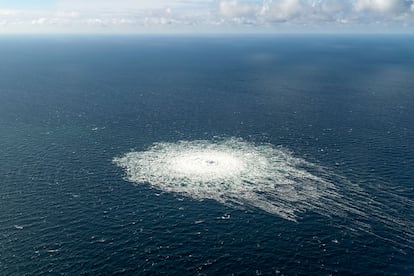Germany issues arrest warrant for Ukrainian national over Nord Stream gas pipeline sabotage attack
Investigators also point to two other Ukrainians as being part of a team of divers who placed explosives on the gas pipeline between Russia and Germany


Germany has asked Poland to arrest a Ukrainian diving instructor who was allegedly part of the team that blew up the Nord Stream gas pipeline nearly two years ago, according to three German media reports. The latest investigations point to Ukrainian authorship of the sabotage, which consisted of several underwater explosions on September 26, 2022, that ruptured the pipeline carrying gas between Russia and Germany seven months after Vladimir Putin’s large-scale invasion of Ukraine.
Berlin has issued an arrest warrant for a Ukrainian citizen, identified as Vladimir S., who allegedly resides in Poland. Investigators suspect two other Ukrainian nationals, including a woman, participated in the attacks as part of the team of divers who placed the explosives on the pipes, a joint investigation by public television ARD, the Süddeutsche Zeitung newspaper and the weekly Die Zeit has revealed.
German authorities have been very cautious and have barely disclosed any details about the investigation into the attack, but the latest media reports point to a pro-Ukrainian group. Responsibility for the attack on the gas pipeline deep in the seabed of the Baltic Sea is one of the big question marks surrounding the first year of war in Ukraine. Russia, to which the first accusations pointed, has always denied responsibility.
The attack on Nord Stream 2 — which has been heavily criticized by the United States and Poland, among others, as it increased dependence on gas from Moscow — surprised everyone in its spectacular nature. Its perpetrators placed high-explosive charges on the bottom of the Baltic Sea and detonated them, undetected, in an area of heavy maritime traffic. Experts said they had not seen such a sabotage attack carried out since World War II.
The pipelines, installed on the seabed at a depth of about 70 meters, covered a route stretching 1,200 kilometers (745 miles) through the territorial waters of five countries: Russia, Finland, Sweden, Denmark, and Germany. Nord Stream 2 was the most recent pipeline (Nord Stream 1 was inaugurated in 2011 by then-German Chancellor Angela Merkel). Its construction was completed in 2021 but it was not yet in operation as Berlin halted it when Russia invaded Ukraine. Both pipelines are majority-owned by Russia’s state-run energy giant, Gazprom.
Official silence
The silence of the countries that have, or have had, open investigations into the sabotage is almost absolute. The governments of Germany, Denmark, and Sweden limited themselves to stating that they were still working, that the investigations were in the hands of independent bodies, and that they would make their conclusions public when they were reached. Sweden and Denmark stopped their own probes earlier this year. Meanwhile, months without official data have been feeding the hypotheses and conspiracy theories, such as that of the well-known American journalist Seymour Hersh, who published a theory based on anonymous sources that led Vladimir Putin to claim the United States sabotaged the pipeline with Norway’s help.
The three German media outlets have published more details about the alleged perpetrators and the operation. It is known that a group of six people — five men and one woman — set sail from the northeastern German port of Rostock on September 6, 2022, on a sailboat named Andromeda. The equipment to carry out the attack had previously arrived at the port on a truck. The next day the ship was located in Wieck, near Rostock, and later on the Danish island of Christiansø, northeast of Bornholm.
The team consisted of a captain, two divers, two dive assistants, and a doctor. Their nationalities were initially unclear as they used fake passports to charter the vessel. According to the new information, the origin of the participants has been clarified. They returned the boat without cleaning it, which led to the discovery of explosive residues on a table. A white van that appeared on September 8, 2022 on the island of Rügen in northern Germany, where the Andromeda also stopped over, also played a prominent role. The driver transported several Ukrainians and identified the now-suspect in a photograph. Vladimir S. was identified as one of the passengers in that van.
The progress reported by the German media on Wednesday shows that the German Public Prosecutor’s Office and the Federal Criminal Police Office (BKA) are keeping the case open and continuing their investigations. Neither commented on the latest developments. The arrest warrant for the Ukrainian suspect was sent to the Polish authorities in June, but they did not execute it within the 60-day deadline stipulated by European law. The last known residence of Vladimir S. was in a town west of Warsaw, but he had recently gone into hiding again and may have returned to Ukraine.
The journalistic investigation notes that it is still unclear to what extent Ukrainian government agencies may have been involved in the preparation and execution of the sabotage. In the case of Vladimir S. and the other two suspects, the investigation has not revealed direct links to the military or secret services. Ukrainian President Volodymyr Zelenskiy has denied his government’s involvement in the attack.
Sign up for our weekly newsletter to get more English-language news coverage from EL PAÍS USA Edition
Tu suscripción se está usando en otro dispositivo
¿Quieres añadir otro usuario a tu suscripción?
Si continúas leyendo en este dispositivo, no se podrá leer en el otro.
FlechaTu suscripción se está usando en otro dispositivo y solo puedes acceder a EL PAÍS desde un dispositivo a la vez.
Si quieres compartir tu cuenta, cambia tu suscripción a la modalidad Premium, así podrás añadir otro usuario. Cada uno accederá con su propia cuenta de email, lo que os permitirá personalizar vuestra experiencia en EL PAÍS.
¿Tienes una suscripción de empresa? Accede aquí para contratar más cuentas.
En el caso de no saber quién está usando tu cuenta, te recomendamos cambiar tu contraseña aquí.
Si decides continuar compartiendo tu cuenta, este mensaje se mostrará en tu dispositivo y en el de la otra persona que está usando tu cuenta de forma indefinida, afectando a tu experiencia de lectura. Puedes consultar aquí los términos y condiciones de la suscripción digital.








































